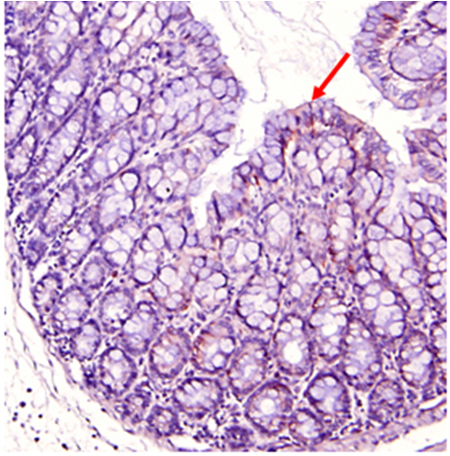anti-IDO (mouse) pAb
| Code | Size | Price |
|---|
| AG-25A-0032-C100 | 100 ug | £282.00 |
Quantity:
Prices exclude any Taxes / VAT
Overview
Host Type: Rabbit
Antibody Clonality: Polyclonal
Regulatory Status: RUO
Target Species: Mouse
Applications:
- Enzyme-Linked Immunosorbent Assay (ELISA)
- Immunocytochemistry (ICC)
- Immunohistochemistry (IHC)
- Western Blot (WB)
Shipping:
-20°C
Storage:
-20°C
Images
Documents
Further Information
Alternate Names/Synonyms:
Indoleamine 2,3-dioxygenase 1; IDO; INDO
Concentration:
1mg/ml
EClass:
32160000
Form (Short):
liquid
Formulation:
Liquid. 0.2µm-filtered solution in PBS, pH 7.4. Contains no preservatives.
Handling Advice:
After opening, prepare aliquots and store at -20°C.Avoid freeze/thaw cycles.
Immunogen:
Recombinant mouse IDO1.
Long Description:
Polyclonal Antibody. Recognizes mouse IDO. Detects a band of ~45kDa by Western blot. Source: Rabbit. Applications: ELISA, ICC, IHC, WB. Liquid. 0.2µm-filtered solution in PBS, pH 7.4. Contains no preservatives. IDO catalyzes the first and rate-limiting step in the main pathway of human tryptophan catabolism, the kynurenine pathway. Proinflammatory mediators, such as endotoxin and IFN-gamma induce the expression of IDO in several tissues. IDO-dependent suppression of T-cell responses might function as natural immunoregulatory mechanism. Physiological IDO activity has been implicated in T-cell tolerance to tumors, dysfunctional selftolerance in non-obese diabetic (NOD) mice, and as a protective negative regulator in autoimmune disorders.
NCBI, Uniprot Number:
P28776
Package Type:
Plastic Vial
Product Description:
IDO1 is a heme enzyme that catalyzes the first and rate-limiting step in the main pathway of human tryptophan catabolism, the kynurenine pathway, causing depletion of tryptophan which can lead to halted growth of microbes as well as T cells. IDO1 is an immune checkpoint protein, thought to play a role in a variety of pathophysiological processes such as antimicrobial and antitumor defense, neuropathology, immunoregulation and antioxidant activity. Cancer cells are able to evade the immune system is by hijacking the checkpoint proteins. Increased IDO1 protein levels drive growth arrest and apoptosis of the effector T cells, a group of immune cells that mediate the immune system?s ability to destroy pathogens. By reducing the number of effector T cells, IDO1 overexpression prevents the immune system from effectively destroying cancer cells. IDO1 overexpression has been observed in a wide range of human cancers such as prostatic, colorectal, pancreatic, cervical, gastric, ovarian, head or lung cancer. Physiological IDO1 activity has been implicated in T cell tolerance to tumors, dysfunctional selftolerance in non-obese diabetic (NOD) mice, and as a protective negative regulator in autoimmune disorders.
Source / Host:
Rabbit
Specificity:
Recognizes mouse IDO1. Detects a band of ~45kDa by Western blot.
Transportation:
Non-hazardous
UNSPSC Category:
Primary Antibodies
UNSPSC Number:
12352203
Use & Stability:
Stable for at least 6 months after receipt when stored at -20°C.
References
IFN-gamma-induced IDO and WRS expression in microglia is differentially regulated by IL-4: M.C. Yadav, et al.; Glia 55, 1385 (2007) | Spontaneous renal allograft acceptance associated with "regulatory" dendritic cells and IDO: C.H. Cook, et al.; J. Immunol. 180, 3103 (2008) | Blockade of Indoleamine 2,3-Dioxygenase Protects Mice against Lipopolysaccharide-Induced Endotoxin Shock: I.D. Jung, et al.; J. Immunol. 182, 3146 (2009) | A novel cancer therapy by skin delivery of indoleamine 2,3-dioxygenase siRNA: M.C. Yen, et al.; Clin. Cancer Res. 15, 641 (2009) | Curcumin suppresses the induction of indoleamine 2,3-dioxygenase by blocking the Janus-activated kinase-protein kinase Cdelta-STAT1 signaling pathway in interferon-gamma-stimulated murine dendritic cells: Y.I. Jeong, et al.; J. Biol. Chem. 284, 3700 (2009) | A combination of the metabolic enzyme inhibitor APO866 and the immune adjuvant L-1-methyl tryptophan induces additive antitumor activity: H.J. Yang, et al.; Exp. Biol. Med. (Maywood) 235, 869 (2010)



